《 学术英语写作 》教学资料
- 格式:docx
- 大小:14.88 KB
- 文档页数:1
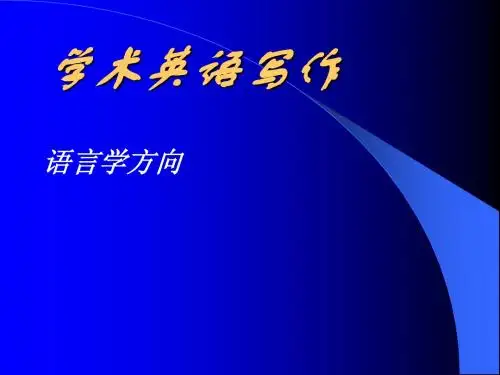
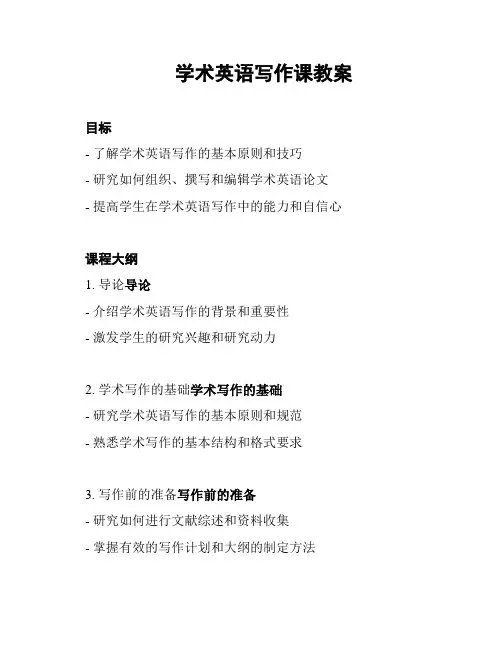
学术英语写作课教案目标- 了解学术英语写作的基本原则和技巧- 研究如何组织、撰写和编辑学术英语论文- 提高学生在学术英语写作中的能力和自信心课程大纲1. 导论导论- 介绍学术英语写作的背景和重要性- 激发学生的研究兴趣和研究动力2. 学术写作的基础学术写作的基础- 研究学术英语写作的基本原则和规范- 熟悉学术写作的基本结构和格式要求3. 写作前的准备写作前的准备- 研究如何进行文献综述和资料收集- 掌握有效的写作计划和大纲的制定方法4. 段落和句子结构段落和句子结构- 研究如何组织和编写清晰、连贯的段落- 掌握句子结构和标点的基本要求5. 论文结构和组织论文结构和组织- 研究学术论文各部分的功能和写作技巧- 掌握论文结构的合理组织和流畅过渡6. 逻辑和推理逻辑和推理- 研究如何进行逻辑推理和论证- 提高学生的逻辑思维和批判性思维能力7. 论文的编辑和修改论文的编辑和修改- 研究如何进行论文的编辑和修改- 掌握常见的错误和问题的识别和纠正技巧8. 学术英语写作实践学术英语写作实践- 鼓励学生进行学术论文的实践性写作- 提供指导和反馈,帮助学生提高写作水平教学方法- 讲授:通过课堂讲解介绍学术英语写作的基本原则和技巧- 练:组织写作练和作业,加强学生的写作能力- 对话:鼓励学生与教师和同学之间进行讨论和交流- 反馈:提供针对学生写作的反馈和建议,帮助其不断提升评估方法- 书面作业:包括综述、论文大纲和论文草稿的写作任务- 口头表达:要求学生进行学术讨论和演讲,展示其写作成果- 个人反思:要求学生针对自己的写作过程进行反思和总结参考资源- Booth, W. C., Colomb, G. G., & Williams, J. M. (2008). The craft of research. University of Chicago Press.- Swales, J., & Feak, C. (2004). Academic writing for graduate students: Essential tasks and skills. University of Michigan Press.- Murray, R. (2019). Writing for academic success. Sage.注意事项- 课程时间安排:每周2节课,每节课2小时- 研究资源准备:学生需要拥有英语写作教材和电子资源- 语言要求:英语水平要求达到中高级水平,能够进行基本的学术交流和写作参与要求- 参加学术英语写作课程的本科生和研究生- 对学术写作感兴趣并有一定英语基础的学生结束语通过学习学术英语写作课程,学生将能够提升自己的学术写作能力,为将来的学术研究和职业发展打下坚实的基础。

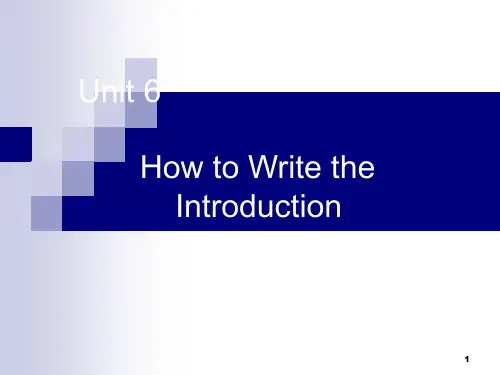
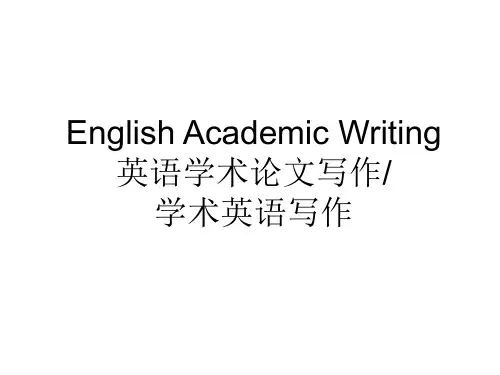

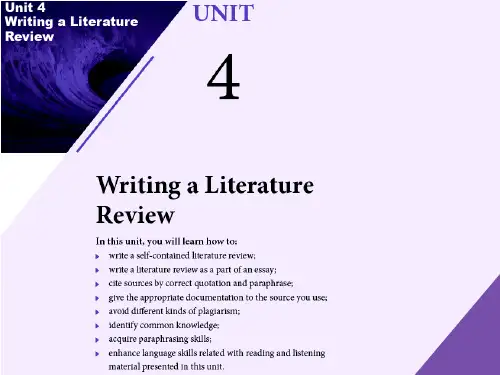
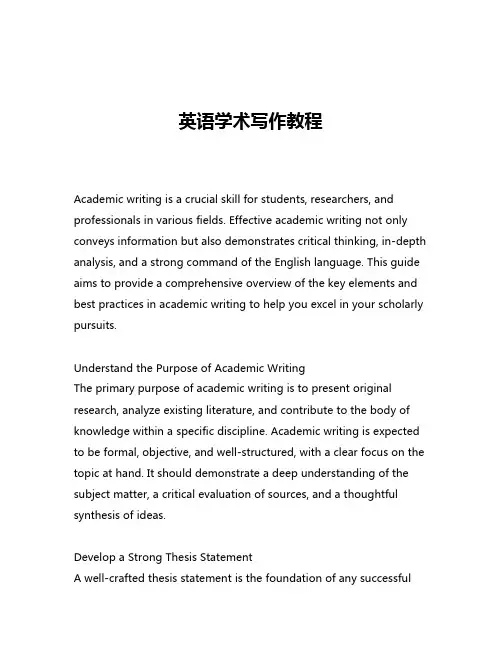
英语学术写作教程Academic writing is a crucial skill for students, researchers, and professionals in various fields. Effective academic writing not only conveys information but also demonstrates critical thinking, in-depth analysis, and a strong command of the English language. This guide aims to provide a comprehensive overview of the key elements and best practices in academic writing to help you excel in your scholarly pursuits.Understand the Purpose of Academic WritingThe primary purpose of academic writing is to present original research, analyze existing literature, and contribute to the body of knowledge within a specific discipline. Academic writing is expected to be formal, objective, and well-structured, with a clear focus on the topic at hand. It should demonstrate a deep understanding of the subject matter, a critical evaluation of sources, and a thoughtful synthesis of ideas.Develop a Strong Thesis StatementA well-crafted thesis statement is the foundation of any successfulacademic essay or research paper. A thesis statement is a concise, one-sentence summary of the central argument or main point of your work. It should be specific, debatable, and clearly articulate the focus of your paper. A strong thesis statement will guide the structure and content of your writing, ensuring that all supporting evidence and analysis are directly relevant to your central claim.Conduct Thorough ResearchEffective academic writing requires a comprehensive understanding of the existing literature and research on your topic. Begin by conducting a thorough literature review, exploring both primary and secondary sources, such as scholarly articles, books, and relevant databases. Take meticulous notes, carefully documenting your sources, and critically evaluate the reliability and relevance of the information you gather.Organize Your WritingAcademic writing follows a structured format, typically consisting of an introduction, body paragraphs, and a conclusion. In the introduction, you should provide background information, establish the context of your study, and clearly state your thesis. The body paragraphs should present your arguments, supporting evidence, and analysis, with each paragraph focusing on a specific aspect of your topic. The conclusion should summarize your key points, reiterate your thesis, and suggest potential avenues for furtherresearch or discussion.Employ Appropriate Tone and StyleAcademic writing is characterized by a formal, objective, and impersonal tone. Avoid using colloquial language, slang, or personal pronouns (e.g., "I," "you," "we"). Instead, use precise, academic vocabulary and maintain a neutral, third-person perspective. Additionally, adhere to the formatting and citation guidelines of your chosen style manual, such as APA, MLA, or Chicago, to ensure consistency and credibility throughout your work.Develop Strong ParagraphsEach paragraph in your academic writing should be well-structured and serve a specific purpose. Begin with a clear topic sentence that introduces the main idea of the paragraph. Support your topic sentence with relevant evidence, such as quotes, data, or examples, and provide thorough analysis and explanation to demonstrate your understanding of the material. Conclude the paragraph by reinforcing the connection between the evidence and your central argument.Craft Compelling Introductions and ConclusionsThe introduction and conclusion of your academic paper are crucial elements that set the tone and leave a lasting impression on your reader. In the introduction, provide background information,establish the significance of your topic, and clearly state your thesis. The conclusion should summarize your key points, reaffirm your thesis, and suggest potential implications or avenues for further research.Revise and Edit ThoroughlyAcademic writing is an iterative process that requires multiple rounds of revision and editing. After completing your first draft, carefully review your work for clarity, coherence, and adherence to academic standards. Check for grammatical errors, awkward phrasing, and logical inconsistencies. Seek feedback from peers, professors, or writing centers to identify areas for improvement and refine your work until it meets the highest standards of academic writing.Incorporate Effective TransitionsSmooth transitions between ideas and paragraphs are essential in academic writing. Use transition words and phrases, such as "furthermore," "in contrast," or "consequently," to guide the reader through the logical flow of your argument. Effective transitions help to establish clear connections between your ideas and ensure that your writing is cohesive and easy to follow.Adhere to Academic IntegrityAcademic integrity is a fundamental principle in the world of scholarly writing. Ensure that you properly cite all sources used inyour work, whether direct quotes, paraphrased information, or ideas borrowed from others. Familiarize yourself with the citation style required by your institution or discipline, and meticulously follow the guidelines to avoid plagiarism, which is a serious academic offense.In conclusion, mastering the art of academic writing is essential for success in various educational and professional settings. By understanding the purpose of academic writing, developing a strong thesis statement, conducting thorough research, organizing your work effectively, maintaining an appropriate tone and style, crafting compelling introductions and conclusions, revising and editing diligently, incorporating effective transitions, and adhering to academic integrity, you can produce high-quality, impactful academic writing that contributes to the advancement of knowledge in your field.。
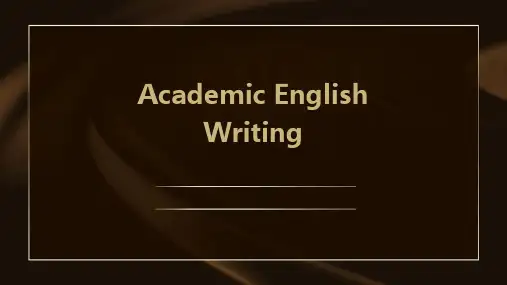
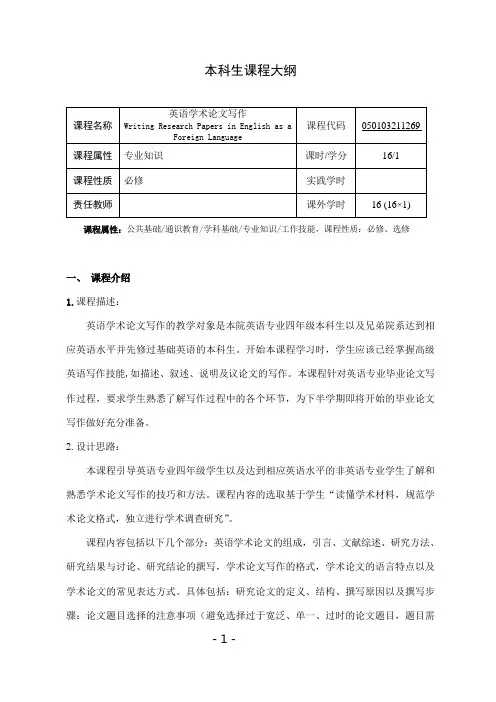
本科生课程大纲课程属性:公共基础/通识教育/学科基础/专业知识/工作技能,课程性质:必修、选修一、课程介绍1.课程描述:英语学术论文写作的教学对象是本院英语专业四年级本科生以及兄弟院系达到相应英语水平并先修过基础英语的本科生。
开始本课程学习时,学生应该已经掌握高级英语写作技能,如描述、叙述、说明及议论文的写作。
本课程针对英语专业毕业论文写作过程,要求学生熟悉了解写作过程中的各个环节,为下半学期即将开始的毕业论文写作做好充分准备。
2.设计思路:本课程引导英语专业四年级学生以及达到相应英语水平的非英语专业学生了解和熟悉学术论文写作的技巧和方法。
课程内容的选取基于学生“读懂学术材料,规范学术论文格式,独立进行学术调查研究”。
课程内容包括以下几个部分:英语学术论文的组成,引言、文献综述、研究方法、研究结果与讨论、研究结论的撰写,学术论文写作的格式,学术论文的语言特点以及学术论文的常见表达方式。
具体包括:研究论文的定义、结构、撰写原因以及撰写步骤;论文题目选择的注意事项(避免选择过于宽泛、单一、过时的论文题目,题目需- 1 -要具体化);介绍图书馆的布局结构,包括在线数据库、搜索引擎和图书馆藏书;学术论文的定义和功能,论文大纲的撰写,以及论文大纲格式的选择;在调查研究过程中,怎样寻找有价值的信息;阅读文献资料以及做笔记的方法;论文初稿的撰写;如何合理利用整理笔记,引用相关文献; MLA格式、APA格式的引用和参考文献的撰写。
课程教学方法以讲授、课堂讨论、课堂测试和小组展示等多种方式结合进行。
3. 课程与其他课程的关系:先修课程:开始本课程学习时,绝大多数学生已经通过英语专业四级考试,并结束专业八级考试,其它院系学生也已经达到相应英语水平,在听、说、读、写、译等方面达到了较高水平;学生应该已经修过英语写作、英语语言学、英语词汇学等课程,零散接触过学术论文写作,有一些感性认识。
本课程是英语专业学生进入毕业论文写作阶段之前必须通过的课程。
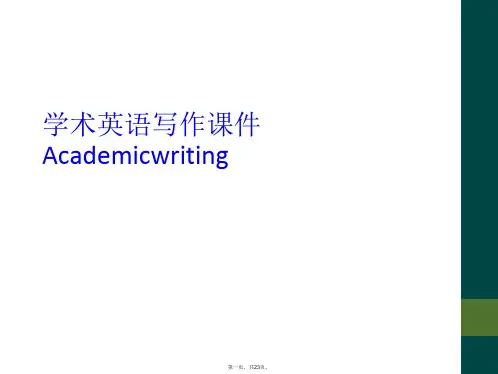
《学术论文写作(英)》课程教学大纲一、课程基本信息课程代码:17002204课程名称:学术论文写作(英)英文名称:Academic English Writing课程类别:通识课学时:64学分:4适用对象: 国际商学院财务管理中外联合培养项目班级;考核方式:考试先修课程:商务英语阅读II,商务英语写作II二、课程简介《学术论文写作(英)》专门针对广东财经大学中外人才培养实验班二年级学生开设的大学英语系列改革课程之一。
该课程是一门桥梁课程,旨在提高中国学生的学术研究与论文写作能力,帮助他们适应接下来的留学学习;课程以学术研究与论文写作各环节和分项技能的训练为纲,帮助学生培养良好的学术研究和写作习惯,并且注重技能的巩固和整合,强调学以致用。
同时,课程注重中西结合,在学术阅读和写作中加强爱国主义教育,增加学生文化自信,培养学生批判性思维,使之既要继承中华优秀传统文化又要弘扬时代精神,既要立足本国又要面向世界,即把中华传统文化以及现代文化的创新成果继承下来,传播出去,发扬光大,最终促使他们成为向世界介绍中国、传播中华文化且具有国际视野的高端双语复合型人才。
该课程教学采取以学生为中心, 教师讲授为引导,学生写作训练、主题讨论以及雅思写作模拟练习为辅助的模式;将面授与机助学习,课内讲授和课后自主学习紧密结合起来。
课堂教学采用外语教学与研究出版社引自的Garnet Education的经典学术英语教材《学术研究与论文写作》和《学术英语阅读》。
本课程的教学评估包括形成性评估和终结性评估。
三、课程性质与教学目的学术论文写作(英)是一门通识必修课,其主要目的是为我校必须参加雅思考试的中外人才培养实验班同学提供系统学习学术英语语言、培养学术论文写作能力和增强雅思写作考试技巧,同时通过大量阅读输入提高学生的学术英语素养、学术英语交流和跨文化交际能力,提升他们的批判性思维能力和跨文化交际意识。
学生学完该门课程后,应能达到以下要求:1)掌握基本学术论文写作技能,包括撰写abstract, introduction, definition, conclusion 的方法和paraphrasing 和referencing 的技巧、规范;2)掌握学术研究的基本方法,包括选题、收集和分类资料、运用论据论证观点、对论据的分析和解释等;3)学生的语篇分析和概括能力,特别是改述(paraphrase)和综述(summarise)的能力显著提升,语言表达丰富多样化;4)学生的批判性思维、西方逻辑思维和东西方文化差异意识通过写作、教师引导、和讨论得以相当的提升;提升学生在学术交流中的辩证性思考能力,能够坚定文化自信,向世界“讲好中国故事,传播好中国声音,阐释好中国特色”,进一步帮助学生树立正确价值观和加强爱国主义教育。